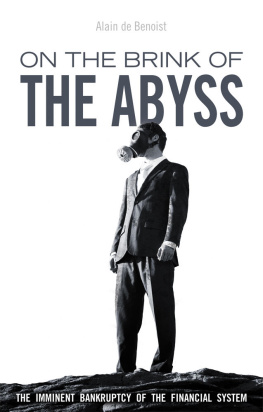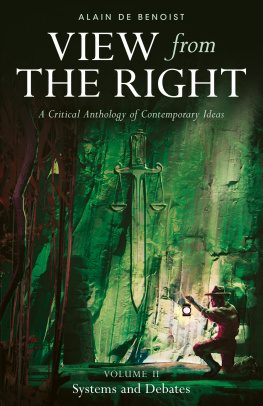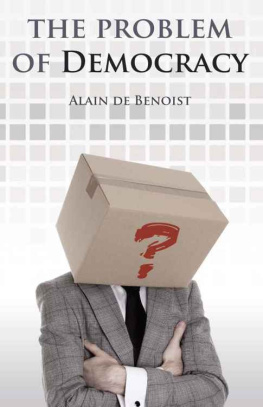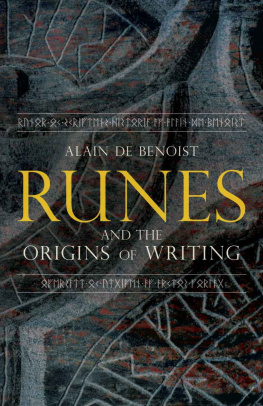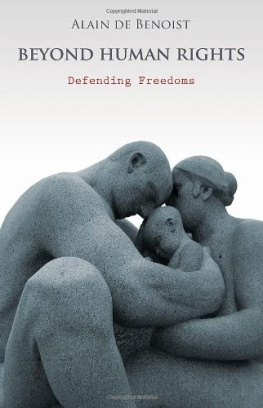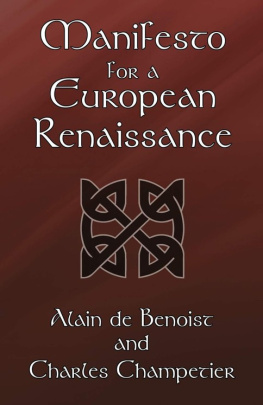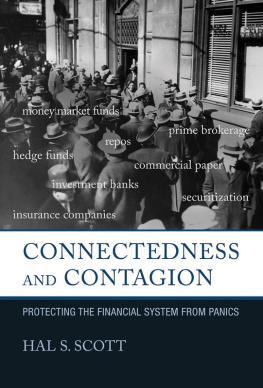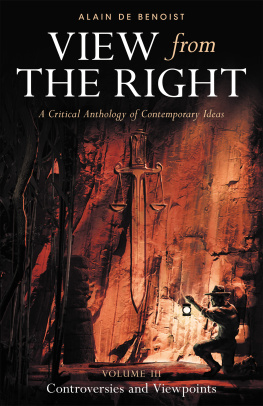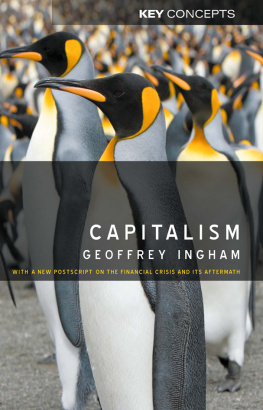On the Brink of the Abyss
Alain de Benoist
On the Brink of the Abyss
The Imminent Bankruptcy of the Financial System
London
Arktos
2015
Copyright 2015 by Arktos Media Ltd.
All rights reserved. No part of this book may be reproduced or utilised in any form or by any means (whether electronic or mechanical), including photocopying, recording or by any information storage and retrieval system, without permission in writing from the publisher.
Printed in the United Kingdom.
First English edition published in 2015 by Arktos Media Ltd.
ISBN 978-1-910524-30-5
BIC-classification
Economic and financial crises and disasters (KCX)
Political science and theory (JPA)
Translator
Alexander Jacob
EDITors
John B Morgan and Matthew Peters
Cover design
Andreas Nilsson
Layout
Tor Westman
ARKTOS MEDIA LTD.
www.arktos.com
Contents
To Pierre Le Vigan
Foreword: Money
Of course, everybody prefers to have a little more money than a little less. Money does not equal happiness, but contributes to it, goes the popular adage. But it would still be necessary to know what happiness is. Max Weber demonstrated that the average level of satisfaction declared by world populations had remained practically unchanged since 1945, despite a spectacular wealth increase in developed countries. (This phenomenon, known as the Easterlin Paradox, has recently been reconfirmed.) The inability of the indices measuring material growth, like the gross domestic product (GDP), to evaluate actual well-being is also well known above all at the collective level, since there is no indisputably held rule that allows individual preferences to be aggregated into social preferences.
It is tempting to see in money only an instrument of power. The old project of radically dissociating power from wealth (either one is rich or powerful) will, unfortunately, remain a dream for a long time yet. Once, one was rich because one was powerful; today, one is powerful because one is rich. The accumulation of money has quickly become not a means for commercial expansion, as some consider it, but the very goal of the production of goods. The capitalist systems only aim is the indefinite increase of profits and the endless accumulation of money. The ability to accumulate money clearly gives an arbitrary power to those who possess it. Many governments are at the mercy of financial speculators. And speculative robbery remains capitalisms preferred method of acquisition.
Money should not, however, be confused with currency. The birth of currency can be explained by the development of commercial exchange. In fact, it is only in exchange that objects acquire an economic dimension. Only then can the economic value of items be objectively determined, since the perceived value of goods involved in an exchange can be measured in relation to one another. Being a generally accepted measure of value, currency is intrinsically unifying. By reducing all goods to a common denominator, it renders exchanges homogeneous. Aristotle already noted, This is why all things that are exchanged must be somehow comparable. It is for this end that money has been introduced, and it becomes in a sense an intermediary for it measures all things. By creating a perspective from which the value of even the most unlike things can be expressed by a number, currency renders them, in a way, equal: it reduces all the qualities that set them apart to a simple logic of more or less. Money is that universal standard which allows us to ensure the abstract equivalence of all merchandise. It is the general equivalent which forces all qualities to be expressed in terms of quantity, since the market is capable only of a quantitative differentiation.
At the same time, exchange also equalises the personality of the participants in the trade. By revealing the compatibility of their supply and their demand, it establishes the interchangeability of their desires and, eventually, the interchangeability of the men who are the locus of these desires. The reign of money, observes Jean-Joseph Goux, is the reign of the only measure according to which all human things and activities can be evaluated A certain monotheistic configuration of the general equivalent value form clearly appears here. Monetary rationality, based on a single standard of measurement of values, is an integral part of a certain theological monotheism. It is the monotheism of the market. Money, writes Marx, is the absolutely alienable commodity, because it is all other commodities divested of their shape, the product of their universal alienation.
Money is thus much more than money and the greatest mistake would be to believe that it is neutral. Money, no more than science, technology, or language, is not neutral. Twenty-three centuries ago, Aristotle already observed that the avarice of mankind is insatiable. the twilight of the gods ( Ragnark ) itself being the result of greed (the gold of the Rhine).
We run the risk, wrote Michel Winock some years ago, of seeing money and financial success become the only standard for social consideration and the only goal of life. It is precisely this point that we have reached. Nowadays, money produces unanimity. The political Right has long ago become its servant. The institutional Left, under the pretext of realism, has rallied loudly behind the market economy and the liberal management of capital. The language of economics has become omnipresent. Money is henceforth the obligatory conduit of all the forms of desire that are experienced within the range of the market. The financial system, however, has only so much time left. Money will perish by money, that is, by hyperinflation, mass bankruptcies, and excessive indebtedness. Then, perhaps, people will understand that one is never truly rich except in that which one has given to others.
The Origins of the Financial Crisis
It is often said that capitalism is synonymous with crisis, that it feeds on the crises that it provokes, and even that its ability to adapt is unlimited, thus letting us understand that it is indestructible. In reality, one must distinguish between short-term, cyclical crises and structural, systemic crises (such as those which occurred between 1870 and 1893, then during the Great Depression of 19291930, and again between 1973 and 1982, when structural unemployment began to appear in Western countries).
The economic cycles that have been described by economists like Nikolai Kondratiev called the time of long duration. The cycles highlighted by Kondratiev in 1926 encompass 40 to 60 years and are divided into two phases. In phase A the rising phase profits are fundamentally generated by production. In phase B the declining phase capitalism, in order to continue to increase profits, gradually turns to financialisation. Capital is increasingly diverted from production to speculation, ceasing to provide opportunities for work by means of productive investments.
Phase A, characterised by the invention and diffusion of numerous innovations, is progressively accompanied by an excess of investments made in order to meet increasing competition, which provokes a rise in prices and interest rates and is the prelude to the next phase of the cycle. In the descending phase, B, massive debts are incurred both by states and households. Along with the over-accumulation of capital, financial power becomes the sine qua non of all strategies aimed at increasing profitability. In the final stage, the speculative bubbles burst one after the other, unemployment increases, bankruptcies multiply, and so on. In this climate of general destruction of value (falling stock prices, businesses shutting down, and unprofitable sectors being liquidated), the economy finds itself in a state of deflation. The system then becomes chaotic and increasingly intolerable, with political and social troubles arising to aggravate the situation.

